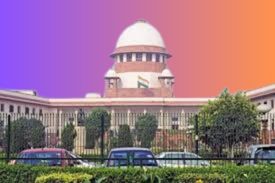Whether NCTE was right in including B.Ed. qualification as an equivalent and essential qualification for appointment to the post of primary school teacher (Level-1)? The Rajasthan High Court in the impugned judgment has quashed the notification dated 28.06.2018, holding B.Ed. candidates to be unqualified for the posts of primary school teachers (Level-1). (Para 6)
B.Ed. is not a qualification for teachers at Primary level of schooling. The pedagogical skills and training required from a teacher at Primary level is not expected from a B.Ed. trained teacher. They are trained to teach classes at higher level, post primary, secondary and above. For Primary level i.e. class I to class V the training is D.El.Ed or what is known as diploma in elementary education. It is a D.El.Ed. training course which is designed and structured to impart skills in a teacher who is to teach Primary level of students. Therefore, by implication the inclusion of B.Ed. as a qualification amounts to lowering down of the ‘quality’ of education at Primary level. ‘Quality’ of education which was such an important component of the entire elementary education movement in this country, which we have discussed in the preceding paragraphs of this order. (Para 27)
This was during the initial period starting from the year 2010 onwards, when the Act and the subsequent order of NCTE laid down the qualifications for Primary School Teachers throughout the country. But essentially B.Ed. qualified teachers were kept out from the purview of the eligibility of the teachers in primary schools as B.Ed. was not considered a “qualification” for teachers at primary level.
The inherent pedagogical weakness in B.Ed. courses (for primary classes), is well recognised, and it is for this reason that in the impugned notification itself it is provided that B.Ed. trained teachers will have to undergo a six months training in elementary classes, within the first two years of their appointment. (Para 29)
Under these circumstances, we are unable to comprehend as to what was the pressing need to include B.Ed. candidates, who are admittedly not fully trained to take up Primary Classes! Consequently, the decision of the NCTE to include B.Ed. as a qualification for teachers in a primary school seems arbitrary, unreasonable and in fact has no nexus with the object sought to be achieved by the Act i.e. Right to Education Act, which is to give to children not only free and compulsory but also ‘quality’ education. (Para 33)
That a statute which is made by a competent legislature is valid till it is declared unconstitutional by a court of law; has been reiterated. (Para 36)
SUPREME COURT OF INDIA
2023 STPL(Web) 165 SC
[2023 INSC 704]
Devesh Sharma Vs. Union Of India And Ors.
Civil Appeal No. 5068 of 2023 (Arising Out Of Special Leave Petition (C) No.20743 Of 2021) With Civil Appeal No(S).5122 Of 2023 (Arising Out Of Special Leave Petition (C) No(S). 17633 Of 2023) @ D.No.21388 Of 2022 With Civil Appeal No. 5070 Of 2023 (Arising Out Of Special Leave Petition (C) No.2069 Of 2022) With Civil Appeal No(S). 5086 Of 2023 (Arising Out Of Special Leave Petition (C) No(S).17630 Of 2023) @ D.No.5464 Of 2022 With Civil Appeal No(S).5121 Of 2023 (Arising Out Of Special Leave Petition (C) No(S).17632 Of 2023) @ D.No.12813 Of 2022 With Civil Appeal No. 5069 Of 2023 (Arising Out Of Special Leave Petition (C) No.2061 Of 2022) With Civil Appeal No(S).5071-5084 Of 2023 (Arising Out Of Special Leave Petition (C) Nos.2578-2591 Of 2022) With Civil Appeal No. 5085 Of 2023 (Arising Out Of Special Leave Petition (C) No.3222 Of 2022) With Civil Appeal No(S). 5087 Of 2023 (Arising Out Of Special Leave Petition (C) No(S). 17631 Of 2023) @ D.No.7368 Of 2022 With Civil Appeal No(S). 5088-5120 Of 2023 (Arising Out Of Special Leave Petition (C) Nos.15118-15150 Of 2022) With Civil Appeal No. 5125 Of 2023 (Arising Out Of Special Leave Petition (C) No.22923 Of 2022) With Civil Appeal Nos.5123-5124/2023 Of 2023 (Arising Out Of Special Leave Petition (C) Nos.21308-21309 Of 2022) With Writ Petition (Civil) No.137 Of 2022 With Writ Petition (Civil) No.881 Of 2022 With Writ Petition (Civil) No.355 of 2022-Decided on 11-8-2023
https://stpllaw.in/wp-content/uploads/2023/08/2023-STPLWeb-165-SC.pdf







